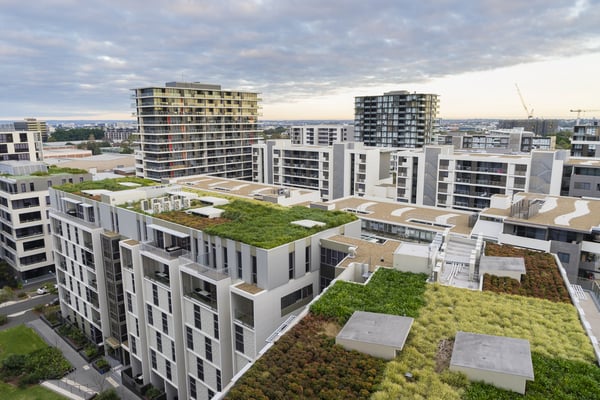On April 2019, the New York City Council passed Local Laws 92 and 94 of 2019. These laws require sustainable roofing systems in new constructions, and also when existing roofs are expanded or replaced. A sustainable roofing system is defined as a solar photovoltaic power generation system, a green roof, or a combination of both.
Local Laws 92 and 94 of 2019 modify the 2014 Administrative Code and Chapter 15 of the NYC Building Code. These laws are part of the OneNYC 2050 strategy, which has climate change mitigation among its main goals.
Does your project meet Local Laws 92 and 94 of 2019?

What Is Required by Local Laws 92 and 94 of 2019?
LL92 and LL94 require a solar panel system, a green roof, or a combination of both for all roof installations in NYC (with some exceptions). The specific requirements change depending on the area and slope of each roof section, and the building’s occupancy classification.
Case 1: Continuous roof area of 200 square feet or more (100 square feet or more in Group R buildings up to five stories), and a slope below 2:12.
If this condition is met, the roof must be equipped with a solar PV system, a green roof, or a combination of both. If the solar power capacity cannot reach 4 kW due to conditions like shading, a green roof is the only option. A minimum solar panel efficiency of 15% must be used for all calculations.
Case 2: Continuous roof area of less than 200 square feet (less than 100 square feet in Group R buildings up to five stories), and a slope below 2:12.
In this case, a combined sustainable roof is not allowed. The area must be fully covered with solar panels if they can reach a minimum capacity of 4 kW. Otherwise, the area must be fully covered with a green roof.
Case 3: Continuous roof area with a slope higher than 2:12.
A solar power system is the only option in this case, since the slope is not suitable for a green roof. If a capacity of 4 kW cannot be reached, that roof section is exempt from LL92/94.
Which Roofs Are Exempt from Local Laws 92 and 94?
LL92/94 of 2019 apply for all rooftops in New York City, unless they fall under the list of exceptions described in their text:
- Roof areas that must be set aside to meet NYC building codes and zoning requirements.
- Roof areas that are occupied by mechanical equipment, water towers, antennas and other important devices. Equipment accesses are also exempt from LL92/94.
- Specific areas that are occupied by components of stormwater management systems.
- Building setbacks: existing terraces that don’t meet the NYC Zoning Resolution, and those that are installed voluntarily. To be exempt, the setback areas must be under 25% of the largest floor plate area in the building.
- Recreational spaces that are important for the building’s occupancy classification, such as sports areas in schools.
- Roofs that cannot accommodate at least 4 kW of solar power capacity, and with a slope above 2:12 that makes them unsuitable for a green roof.
- Any area where the NYC Department of Buildings considers that conditions are unsuitable for a solar or green roof system. For example, this applies for roof replacements where the building structure cannot tolerate the additional weight of a sustainable roofing zone.

Rooftops in the affordable housing sector are also subject to LL 92/94 of 2019, but the law will apply fully until November 15, 2024. Before that date, these buildings are only subject to LL92/94 to the extent specified by the Department of Housing Preservation and Development. Specifically, the following building types are subject to the reduced requirements:
- Buildings with one or more dwellings where occupancy is restricted based on occupant income - conditioned by a loan, grant, tax exemption or conveyance of property (according to local legislation).
- Buildings subject to the alternative enforcement program in the NYC Administrative Code.
- Buildings owned by the Department of Housing Preservation and Development (HPD).
Who Can Design a Sustainable Roofing System?
To meet LL92/94 of 2019, you must first determine which roof areas must be covered by solar panels, which must be covered by green roofs, and which are exempt. When a roof section cannot accommodate 4 kW of solar power capacity, you must provide supporting documentation. The calculations and shading report can only be performed by a NYS registered design professional, or a contractor with one of the following credentials:
- NABCEP Certification - North American Board of Certified Energy Practitioners
- IBEW-NECA Electrical Journeyman & Apprentice Training - International Brotherhood of Electrical Workers and National Electrical Contractors Association
- UL Credential - Underwriters Laboratories
The sustainable roofing systems required by LL92/94 are subject to all applicable codes and laws. These include the NYC Building Code, Fire Code, Electrical Code, and Zoning Resolution.
When Will Local Laws 92 and 94 Be Applied?
The requirements in Local Laws 92 and 94 apply for all projects approved after November 15, 2019. In the case of projects with a pending approval, the new laws apply if they don’t reach job status K by November 14 at 3:00 pm.
Sustainable roofing systems under LL92/94 of 2019 are subject to a design approval procedure by the NYC Department of Buildings, like any other property modification. To meet all requirements and ensure a quick approval, the best recommendation is contacting a qualified engineering firm for the property assessment and project design.
NYC buildings are subject to local laws that cover areas like emissions and fire safety. NY Engineers can help you stay compliant: call (786) 788-0295212-575-5300 or write at info@ny-engineers.com.
